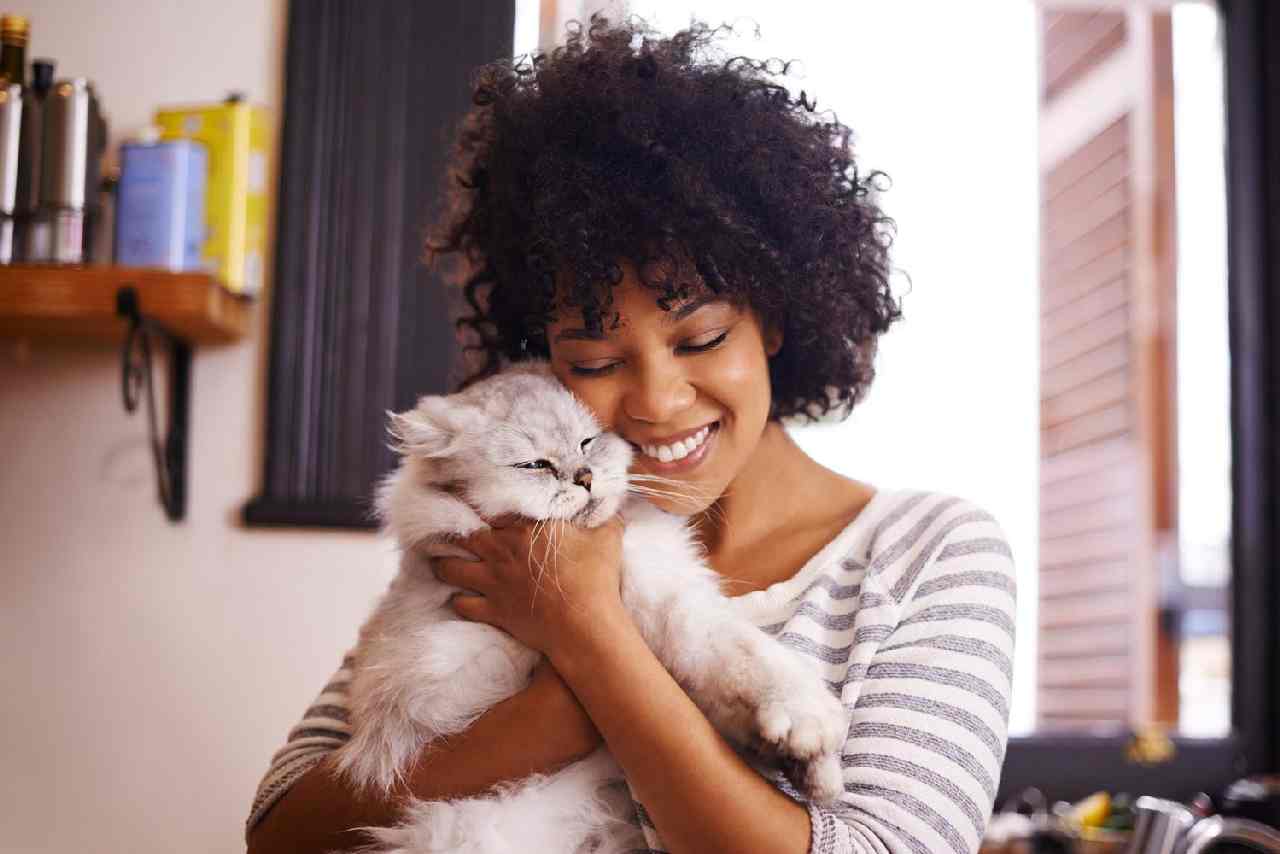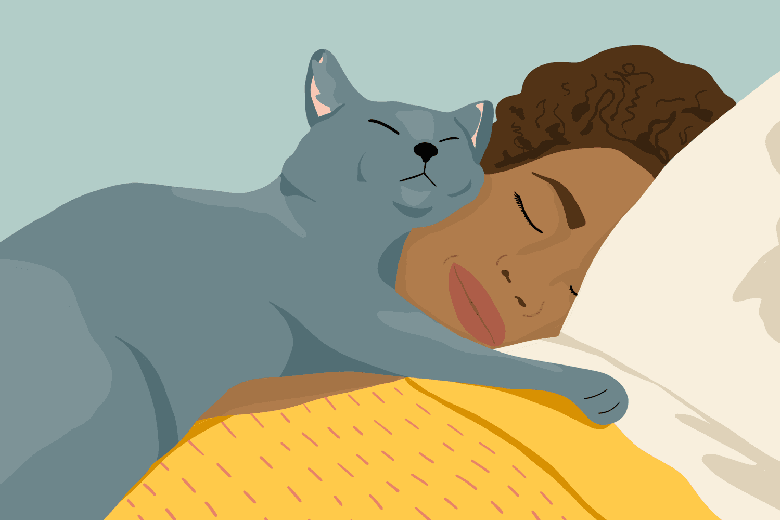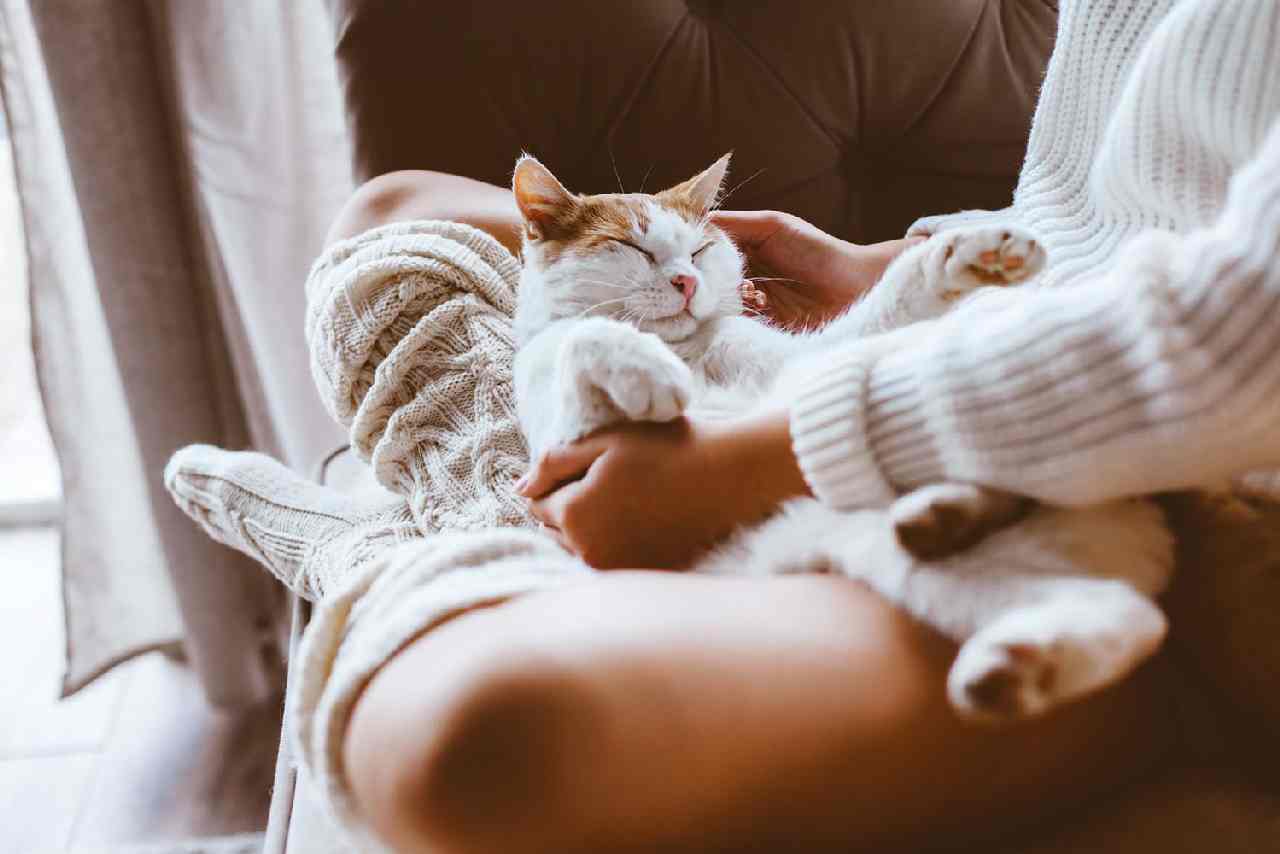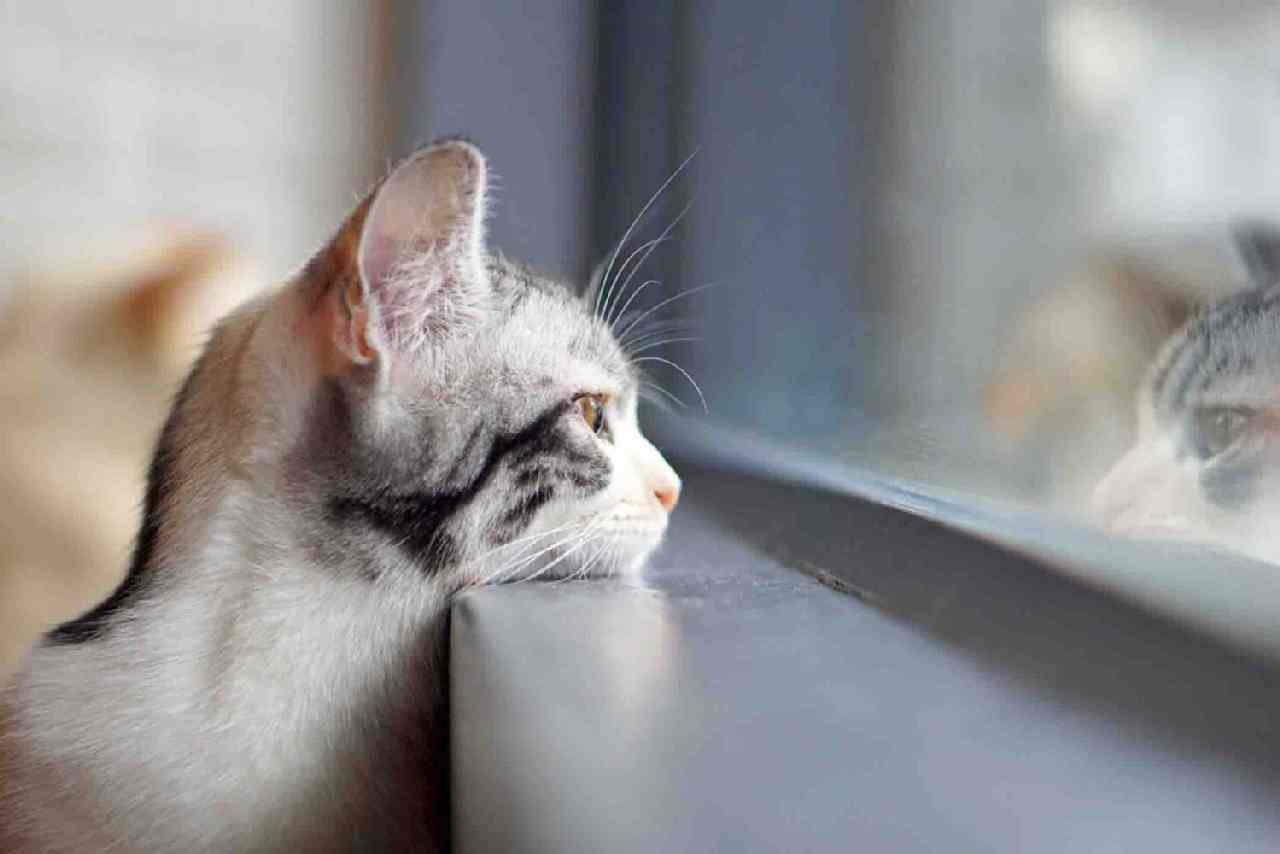Cats sometimes get a bad rap. After all, the old adage isn’t “Cats are man’s best friend.” And the endless memes and ‘grumpy cat’ videos certainly contribute to the myth that felines, for the most part, merely tolerate our human existence.
So, do cats love their owners? We asked animal behaviorist Julie Posluns, ACAAB, and owner of Cat School to lay to rest some fussy kitty stereotypes once and for all.
Does Your Cat Love You?
“Many people find it amusing to classify cats as mysterious, independent creatures with no desire to comply with human wishes,” Posluns tells Daily Paws. “For example, cats were unhappy subjects in many [pandemic] quarantine memes because of the disruption to their alone time. While meant to be funny, they perpetuate the idea that cats don’t appreciate human contact, which we know isn’t true.” She adds that our feline friends are absolutely social pets who develop strong bonds with their humans and benefit from consistent attention.
Is this bond ‘cat love’? Well, it’s hard to ask Fluffy directly and get a definitive response (wouldn’t that be cool!). But many curious scientists believe the answer is yes. Well, as much as we perceive it to be, anyway.
For example, professors Kristyn Vitale and Monique Udell at the Human-Animal Interaction Lab at Oregon State University evaluated 100 kitties to determine the attachment they have for their humans—and the connection is much more than as a food dispenser or waste management authority. The 2019 study observed cats’ behavior while in an unfamiliar lab room with their caregivers for a few minutes, then alone, and again when their caregivers returned.
As Vitale shared findings with OPB, she said, “When the owner comes back, they’ll go to the owner and greet them, and then they’ll display this contact exploration balance: they’ll periodically go back to the owner for attention and then go explore the room, explore the toys, and then go back to the owner.” Using a psychological assessment guide known as secure attachment, the cats in the study displayed approximately the same level as children … and dogs!
“Cats are more independent in that we don’t have to train them to use the litter box the same way we have to housebreak a puppy. But that doesn’t necessarily mean they don’t use us as a source of security and that they aren’t affectionate towards people,” Vitale stated in her OPB interview. “That’s what we’re finding: the majority of cats do use their owners as a source of security and rely on them for comfort.”
Thus, Posluns says, when cats feel safe and secure in their environment, they become ‘friendlier’ companions. “It can be a rewarding experience to build a trusting relationship with a cat and watch them go from fearful to friendly.” So in their way, a sweet, attentive, and even demonstrative kitty is showing affection.
Awwww, we knew they weren’t simply playing us for treats!
10 Friendly Cat Breeds Who Make Perfect Pets
Signs Your Cat Loves You
Vitale noted in her research that cats not only spend more time with people who are attentive to them, but also that 50 percent of them, when given the choice, most preferred human interactions over their favorite food, scent items, and toys. So it would seem that these cats love their owners quite a bit!
But how do you know if your cat loves you? Well, keeping in mind that every feline has a unique personality, just as we do, Posluns says there are some key signs of a strong human-cat bond:
- Slow blinks: “Most cat lovers are familiar with how a cat presents slow blinks when they are happy and comfortable,” she says.
- Following you around: As long as kitty feels okay, this behavior is usually an indication they want attention or simply enjoy your company.
- Head bunts and close contact: “Contact may include rubbing their head or body against their human or clawing a person’s legs for attention,” she adds.
- Butt in your face: Yes, really! Many animals say “Hey, hi, how are you?” this way with each other, so it’s natural for a trusting and affectionate kitty to present their posterior as a form of communication.
- Cuddles: You can likely trust the lap takeover and biscuit making as a sign your cat loves you and considers sharing personal space a pleasure.
Posluns adds kitties have sophisticated communication signals as well, and that their tail positions, postures, purrs, and other various noises tell us a great deal about their emotions. “Cats use lots of different vocalizations when they get excited, and may greet people with trills and chirrups, which indicate positive feelings,” Posluns says. “If you want to understand your cat better, I recommend learning to read their body language.”
And when your kitty meows, feel free to talk back! Along with spoiling them rotten every day, this type of exchange helps tell your cat you love them.
Why Does My Cat Sound Like a Pigeon?
Do Cats Feel Love the Same Way Humans Do?
There’s really not a scientific way to quantify this, but based on what experts know of cat behavior, felines certainly have ways of letting us know when they’re comfortable or not.
“When cats avoid contact with people, it can be due to a fear of humans from a lack of socialization or a negative experience. It’s hard to compare the friendliness of cats and dogs because we don’t socialize them similarly,” Posluns says. “Most puppies get exposed to new people when they’re young, for example, in puppy classes.” In contrast, she adds, many kittens will hardly have any human contact during their socialization period. A less-socialized cat requires more positive experiences before they can feel safe with a stranger.
According to Alley Cat Allies, a cat advocacy program, socialization refers to when a feline is “accustomed to and enjoys companionship with people. To socialize a cat means to gradually acclimate her to human touch, human spaces, and human sights, smells, and sounds. It’s a process that is influenced by many factors of a cat’s life and takes time and effort from compassionate people.” Fortunately, the organization provides a handy guide that explains the socialization process.
As a conscientious pet parent, Posluns says, training is also a great way to get a sense of how your cat feels about something. For example, if they have a favorite treat but won’t eat it in certain situations, it might be an indication they’re uncomfortable in a particular environment.
6 Ways to Show Your Cat You Love Them, Too
Strengthening the relationship with your favorite furry friend is truly gratifying—and why you decided to share life with such captivating creatures.
To encourage more cat love, here’s what Posluns recommends:
- A strong bond is based on trust and communication. To build trust, give your cat choices to participate in all activities. For example, instead of picking up your cat, which they may not enjoy, teach them to jump on your lap so they can initiate contact.
- Train your kitty to accept nail trims and brushing so you aren’t sneaking up on them or having to force them.
- Avoid using punishment like spray bottles because that will break your bond.
- Cats need consistent and positive interaction with their people. Spend time playing with your cat, including toys and other games. Like dogs, cats have a strong sense of smell and searching for food, such as in a puzzle feeder, can be an enriching experience, too.
- Cats respond well to positive reinforcement training. By teaching your cat skills and tricks, such as ‘sit’ and ‘high five’, this engagement improves communication between you.
- If you have an indoor cat, consider training them to walk with a harness and leash so they have safe access to the outdoors and you have a fun way to spend time together.
8 Tips to Get Any Cat to Like You More







